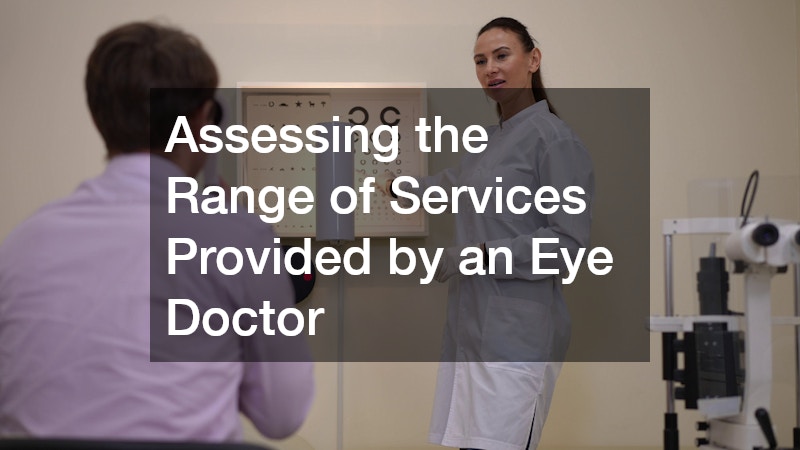Choosing an eye doctor for your family’s needs is a significant decision that can affect not only vision but overall well-being. Eyesight is essential for learning, work, and daily life, so ensuring every family member receives the right care is paramount. Children, in particular, rely on clear vision for their education and development, while adults need regular monitoring to prevent and manage conditions such as glaucoma, cataracts or age-related macular degeneration.
With so many options available, it can feel overwhelming to know where to start, especially when balancing factors like location, experience, services offered, and the comfort of both children and adults. This guide will help you navigate these choices with confidence.
Understanding the Roles of an Optometrist, Ophthalmologist, and Optician
When selecting an eye doctor, it’s important to understand the roles of different professionals. An optometrist provides primary vision care, including eye exams, prescribing glasses and contact lenses, and identifying eye conditions. An ophthalmologist is a medical doctor specialising in eye and vision care who can perform surgeries, treat eye diseases, and manage complex medical conditions. Finally, an optician fits and dispenses glasses and contact lenses based on prescriptions but does not perform eye exams or medical treatment.
Knowing these distinctions helps you select the right professional for your family’s needs. For routine check-ups and vision correction, an optometrist is usually sufficient. If medical or surgical intervention is required, an ophthalmologist is the appropriate choice. Understanding the responsibilities of each professional ensures your family receives the correct level of care.
Verifying Qualifications and Experience of an Eye Doctor
When it comes to eye health, qualifications and experience matter. All practising optometrists and ophthalmologists must be registered with the relevant Australian regulatory bodies. Checking credentials, years of experience, and special interests or areas of expertise can provide confidence in the care your family will receive.
Patient reviews and testimonials are also valuable. Speaking with other patients or seeking recommendations from friends, family or your local GP can highlight how the eye doctor manages appointments, communicates effectively, and addresses concerns. Remember, a highly qualified practitioner who is also approachable and patient-focused often makes for the best experience for both adults and children.
Choosing a Family-Friendly Eye Clinic
The environment in which care is provided is just as important as the practitioner’s skills. A family-friendly eye clinic should be welcoming, comfortable, and accessible to people of all ages. Look for clinics with waiting areas designed for children, flexible appointment times, and staff who are trained in working with young patients, creating a calm and reassuring atmosphere for every visitor.
Other practical considerations include clinic location, parking availability, and accessibility features such as ramps or lifts. A clinic that offers thorough explanations, clear guidance on treatment options, and follow-up care shows that the practice values patient education as much as medical expertise. A positive environment can make eye exams less stressful for children, provide support for anxious adults, and ensure that everyone feels confident in the care provided.
Assessing the Range of Services Provided by an Eye Doctor
Different eye doctors offer varying services, so evaluating what is available is key. Standard services typically include comprehensive eye exams, prescription glasses, contact lenses, and basic treatments for common eye conditions. Some practices also provide specialised services such as treatment for dry eyes, glaucoma monitoring, paediatric eye care, and minor surgical procedures.
It is also worth confirming whether the clinic offers emergency care or can provide referrals to ophthalmologists if more advanced treatment is needed. A practitioner who can manage a wide range of conditions and coordinate care when necessary ensures your family receives comprehensive, continuous eye care. Assessing services beforehand prevents unnecessary referrals and gives peace of mind that your family’s vision is in capable hands.
Choosing the right practitioner involves more than simply booking an appointment. By understanding the differences between optometrists, ophthalmologists, and opticians, verifying qualifications and experience, considering the clinic environment, and assessing available services, you can make a well-informed decision.
Investing the time to select an eye doctor who meets your family’s unique needs helps safeguard vision, prevent complications, and ensure a comfortable, supportive experience for everyone. Taking the time to research options, read patient reviews, and visit clinics in person allows you to make a decision that balances professional expertise with a welcoming environment. With careful consideration of qualifications, services offered, and family-friendly facilities, you can establish a long-term relationship with an eye care professional who understands your family’s needs and responds promptly to any concerns. This thoughtful approach provides peace of mind, knowing that your loved ones are receiving attentive, personalised care. By prioritising both clinical excellence and a supportive atmosphere, your family can enjoy the confidence that comes from knowing their eye health is in expert hands, and that their vision will be monitored and protected at every stage of life.





